Poetry & Me 3/16/2021
- Sarah Scrattish

- Mar 17, 2021
- 8 min read
Poetry is...
Music that I listen to
Stories that I know well
Sounds that no one else around me has heard
Sights that I cannot quite catch on camera
Certain words that just dance together
On the page or from the mouth
Poetry is...
The people I share meals with
The dawn that breaks
And the sun that sets
Poetry is...
Visual
Auditory
Written
Painted
Spoken
Danced
Rhythmic
Fluid
Movement
Poetry truly is...
One of my most favorite things.
I love poetry.
I think I've always loved poetry and I can't quite say why I think this, but I think I just have always had this innate sense and love of and for words. When I found out that there was a museum for words opening up in Washington DC I felt chills all over. I just love the idea of writing words, speaking words together that hold power, and encouraging others. I love to create works of art through writing whether it be poetry or lists or specific adjectives.
I grew up reading books with rhyme schemes like Night House Bright House by Monica Wellington and my copy of Where the Sidewalk Ends by Shel Silverstein -- very tattered and torn from all that I've read and had my mother read aloud to me. Books were a staple in my home and my mother whom I had the absolute pleasure and honor of having as a stay-at-home mother throughout all of my childhood would read to me constantly. We would take numerous trips to the library for interactive stories and crafts and we always always read a story before bed time. Many of these books were written with such a poetic craft and I am thankful for these treasured experiences I had at such a young age.
Another of my most fond memories is during one of my upper elementary years (fifth grade I do believe) we crafted poems and learned about different formats of poetry. In this end-of-year unit, we created little limericks and other typical styles of poems. To all of our surprise and motivation, our teacher informed us that we could be selected to have our work published in a book of poems by other students as well! I was ecstatic to know that one of my very own poems was selected to be published in this book! Now, I cannot remember what the title of this book even was or where I have stored it in my childhood home, but I do know that this experience boosted my confidence as a student writer and as a writer of poetry. **I absolutely plan to keep this in mind as I will go on to teach my own students about poetry.
Fast forward to my adult life, and I am still diving into poetry in all formats -- new and old. During one of my trips abroad we stopped on our way home at the Newark airport in New Jersey. During this hours upon hours long layover, I noticed one of those little shops in the airport, this one being in support of and selling merchandise for the New Yorker or supporting the MET museum... I can't quite remember -- the jet lag was getting to me okay... But in this little shop, I found what came to be one of my favorite books I have ever owned. Poems of New York Everyman's Library Pocket Poets.

In this book I have read countless, timeless poems about New York, from New York, and from the Poets of New York. Most of them I cannot comprehend or understand for the language is too old or too profound, but I know that even though I don't quite understand the "meaning" I do know that the collection of words is beautiful and it almost sings a sweet story to me as I scan the page.
Here is an example of one of these poems:
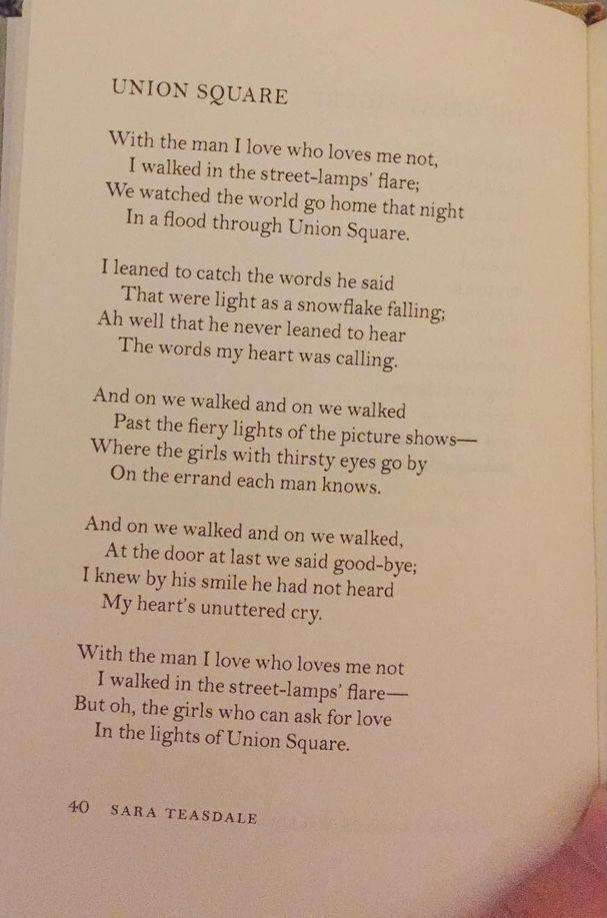
Typically I find awe and love in a poem through the dance and rhythm or through the emphasis of the words/specific words. In this poem, it feels bouncy but there is still a depth to it, hearing her "heart's unuttered cry" but keeping pace. There is enough detail to describe the setting without telling too much. Poems are so much about "showing not telling" through writing, making every single word in the piece meaningful. The repetition of certain phrases brings the reader back to a place of knowing and thinking about the poem. "And on we walked and on we walked..." This phrase is what keeps the poem moving, it elapses time without having to say that -- it progresses the story in such a simple way while also emphasizing her longing, as if time has no care or empathy for her current situation. I have read this poem over and over, the first time really not quite getting "it" but at the same time I understood what she was saying. The more that I have read it, the more I see and understand what the poet is explaining to the reader. Each time that I read this poem I just adore it all the more.
What I love the most about poetry (I think) is that there are SO many different ways to write a piece of poetry. There are no limits or bounds with any one work. The poet could begin the piece with a certain style in mind like a couplet or haiku, but then they can spin it into a completely and beautifully structured free verse poem. Poetry can rhyme or it can not rhyme. A single word can take up an entire line or each letter of a word can move on the page creating a completely new meaning to the piece. The spacing and the shape of the poem is also something I love because there are so many directions an author or poet can take when writing a poem that a novelist might not be able to portray with the typical structure of paragraphs and quotations for dialogue. Hear me out, I am not diminishing the intense work of novelists because that is tedious and detailed and tough work!! But there is just something that draws me in personally to a short work of poetry that can say so much than is even presented on the page.
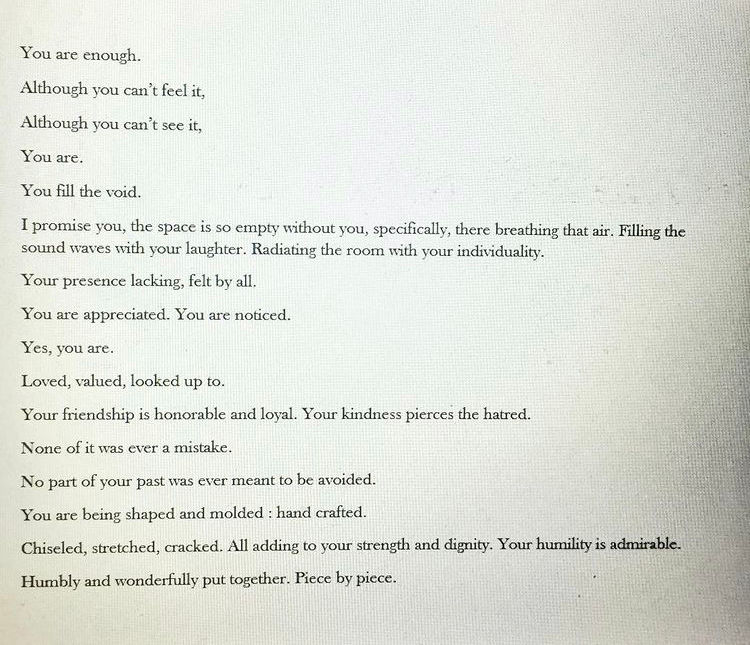
Although I feel like I'm making it sound as if poetry is simple and easy to create, I understand how daunting the task can be, especially reading your own work in front of a group of people! That is a vulnerable place to be! I've done it myself and I truly thought I was going to choke and maybe even (excuse the unwanted imagery) throw up in front of a crowd when I offered to read one of my own poems during a worship night a couple of years ago. Even though this was one of the bravest things I feel I have done, it was the most tender of experiences. After I had read this piece people were expressing their thankfulness and connections to this work -- I'm so glad I decided to read this aloud. The speaking of the words offered up even more opportunity for emphasis and pace and structure to the poem.
The fun in writing poetry can also take place through working modalities of art into it, whether it be creating a dance to a spoken word or water coloring and creating the poem in the shape of the piece such as one poem I have previously created entitled "weeds."

This piece was so fun to create because it was so simple! A few dashes of color and emphasis on the shape allowed this piece to take on a whole new and visual meaning to the reader!
Needless to say, I have had bountiful, positive experiences with poetry from even a young age. I adore poetry and all that it has to offer to readers. I believe anyone can be a poet and I will attempt to embody this attitude as I cultivate, create, and work diligently with my very own book of poems this year. It is my goal to produce my own book of poems so that others can see and feel all that God has in store for them through the format of poetry.
Some of my newfound and current favorite poets include Morgan Harper Nichols, whose work can be seen across many social media platforms including Instagram (@morganharpernichols), which is where I had the joy of discovering her works. One of my favorite poems by her is one she crafted that focuses on finding joy in "the little things." Nichols' work is geared towards adults but I would find nothing wrong with sharing and reading her works with children! Her work really could be classified as being for "everyone." Another of my newfound favorite artists is Scott Erickson who can be found on Instagram as well @scottthepainter. Erickson, I'm not sure is fully considered as a poet per say, but he creates works of art and writes about them either in story or poetic format. His work is more for adults that highlights aspects of the Christian faith, but certain pieces would be more than appropriate to share and discuss with children.
This past week I have had the joy of reading new-to-me works of poetry in the books of Firefly July a Year of Very Short Poems which is a collection of poems by different authors that have been selected and put into this book by Paul B. Janeczko. I have also been diving into the works of All the Small Poems and 14 More by Valerie Worth and pictures by Natalie Babbitt. The text Awakening the Heart Exploring Poetry in Elementary and Middle School by Georgia Heard is a work that is aiding in my thinking about the many engaging ways I can include and practice writing, exploring, and teaching poetry into my classroom for the coming future.
Read aloud of Firefly July:
These works have been fueling my ideas for how I want to craft a "poetry environment" within my classroom, especially the chapters I have read in Awakening the Heart. For the past year or so I have been collecting "ideas" in my notes app on my phone for the kinds of writing activities I want to do with my students in my classroom:
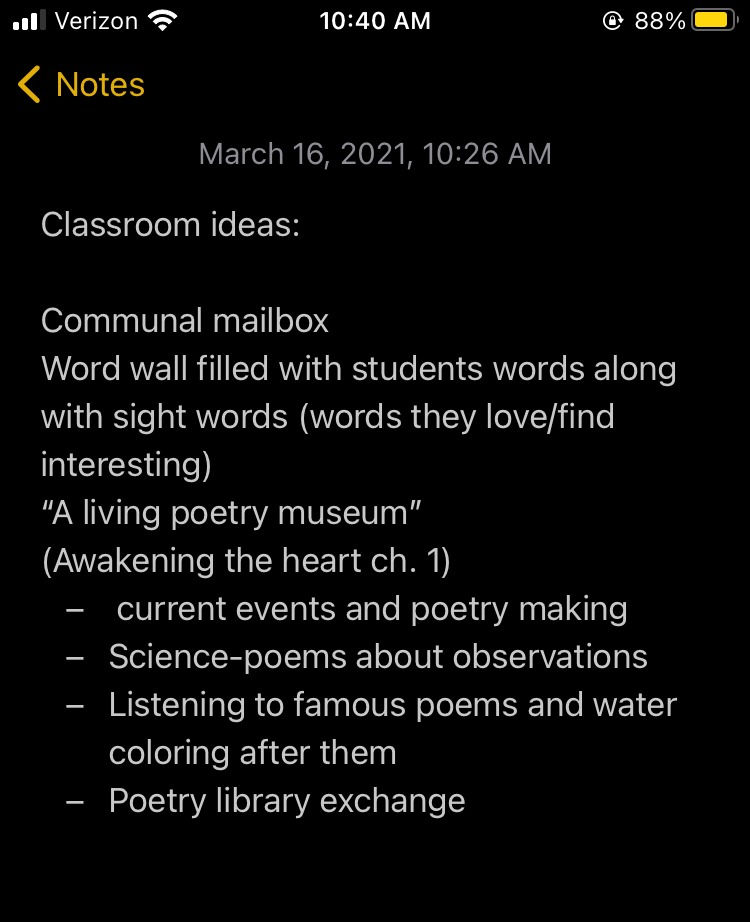
When I was reading some of the incredible ideas in the text Awakening the Heart, I noticed a lot of the ideas I had already written down or had swirling around in my head for the longest time were in this book! Heard had put into words and actions the kinds of things I want to do in my classroom and she gave me a reason to do so.
With mentor texts such as Firefly July and All the Small Poems and 14 More, I find many of these ideas to be possible. Something else that Heard talked about was letting children read over and listen to poems from great authors like Langston Hughes and Emily Dickenson. I have been thinking over the idea of reading works to children that might not make sense to them -- even the youngest of learners (Kindergarten - 2nd grade). Even if these tiny humans can't quite understand what is being read to them, they will be at least given the opportunity to hear words spoken, written, and read aloud to them. They may be inspired by some of the phrases, drawn in to some of the imagery, or grow into some of the most profound child/adult writers the world has ever seen because they will have heard it all from the past "greats" to the current styles of writing poetry.
I can't wait to show my students how to become scientists and historics, artists and mathematicians all through writing, reading, and exploring poetry. I feel confident in teaching poetry to little ones because I practice it currently. I can take what I know about it, what I'm learning from poetry, and read students some of the works I'm reading now (like The Crossover by Kwame Alexander) to help grow them as writers and poets who can also succeed in other areas of academics in their lives.











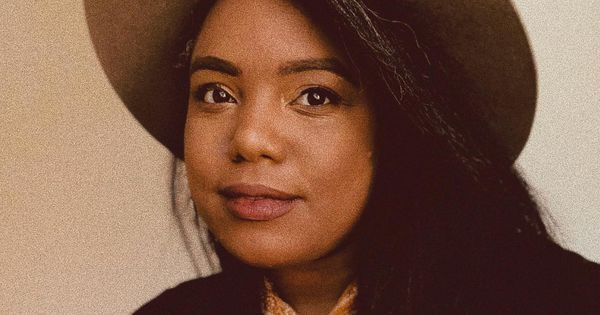







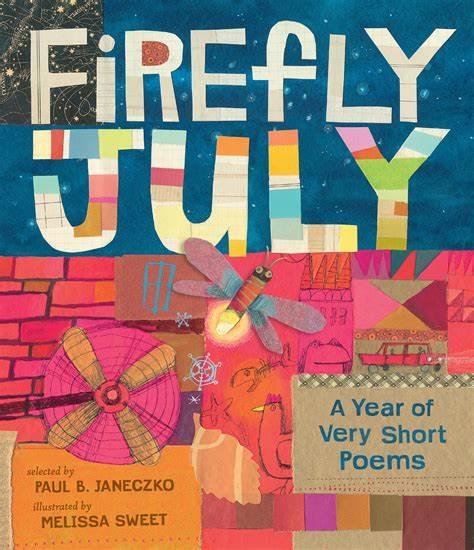

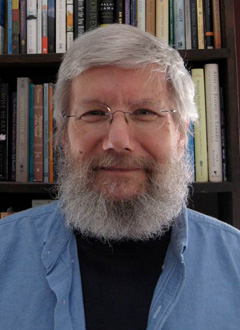



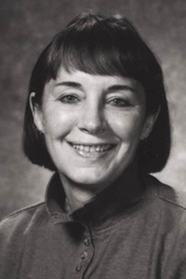

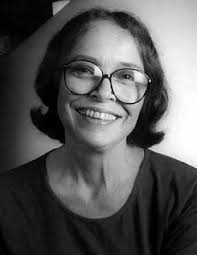

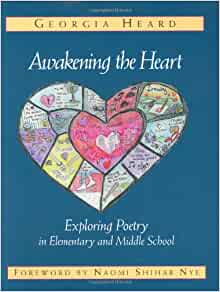




Comments